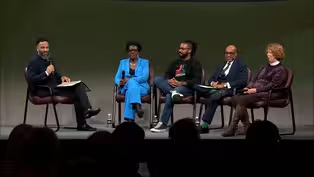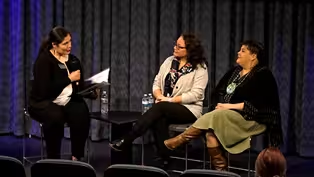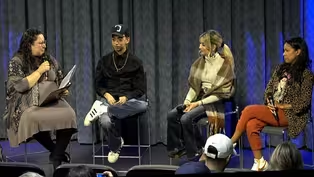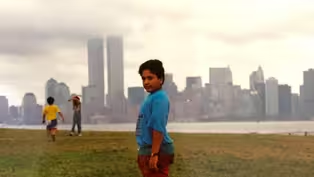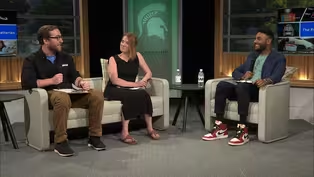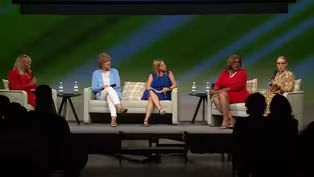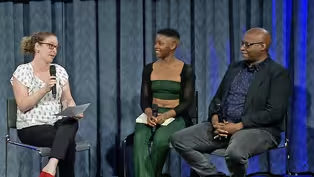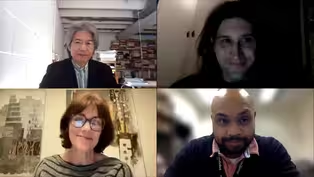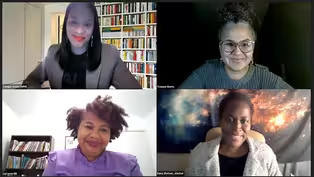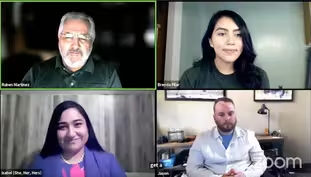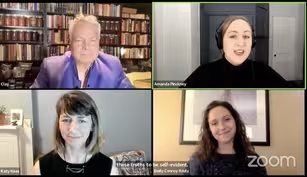
Panel Q & A - Afrofuturism
Special | 33m 56sVideo has Closed Captions
Panel discussion following the episode Afrofuturism, from the Artbound series
With panelists Julian Chambliss, Val Berryman Curator of History at the MSU Museum; Theodore Ransaw, Outreach Specialist for College of Education; Elka Stevens, visiting professor and textile and mixed media artist; Crystal Bernard, recent MSU graduate; and moderator Erik Ponder, African Studies Librarian. Presented as part of Michigan State University's Juneteenth Celebration 2022.
Problems playing video? | Closed Captioning Feedback
Problems playing video? | Closed Captioning Feedback
WKAR Specials is a local public television program presented by WKAR
Presented as part of Michigan State University's Juneteenth Celebration 2022.

Panel Q & A - Afrofuturism
Special | 33m 56sVideo has Closed Captions
With panelists Julian Chambliss, Val Berryman Curator of History at the MSU Museum; Theodore Ransaw, Outreach Specialist for College of Education; Elka Stevens, visiting professor and textile and mixed media artist; Crystal Bernard, recent MSU graduate; and moderator Erik Ponder, African Studies Librarian. Presented as part of Michigan State University's Juneteenth Celebration 2022.
Problems playing video? | Closed Captioning Feedback
How to Watch WKAR Specials
WKAR Specials is available to stream on pbs.org and the free PBS App, available on iPhone, Apple TV, Android TV, Android smartphones, Amazon Fire TV, Amazon Fire Tablet, Roku, Samsung Smart TV, and Vizio.
More from This Collection
Panel discussions following WKAR film screenings. Featuring filmmakers, policy makers, community partners and more.
Panel Q & A - The Cost of Inheritance
Video has Closed Captions
Panel discussion following the film The Cost of Inheritance. (30m 59s)
Video has Closed Captions
Panel discussion following the film Warrior Lawyers. (33m 42s)
Panel Q & A – First Voice Generation
Video has Closed Captions
Panel discussion following the film First Voice Generation. (31m 2s)
Video has Closed Captions
Panel following the film "American Jedi." Discussion features the film’s producers. (48m 46s)
Panel Q & A – NOVA Science Studio Showcase
Video has Closed Captions
WKAR showcases highlights from the NOVA Science Studio project. (53m 35s)
Panel Q & A – Building the Reading Brain
Video has Closed Captions
Panel discussion following the WKAR original film, Building the Reading Brain. (36m)
Video has Closed Captions
Panel discussion following the film Afrofantastic. Featuring filmmaker Julian Chambliss (29m 6s)
Panel Q & A – Free Chol Soo Lee
Video has Closed Captions
Panel discussion following the film Free Chol Soo Lee. (29m 48s)
Panel Q & A - Storming Caesars Palace
Video has Closed Captions
Panel discussion following the film Storming Caesars Palace (25m 19s)
Panel Q&A - Brenda's Story: From Undocumented to Documented
Video has Closed Captions
Panel discussion following the film Brenda's Story (25m 44s)
Panel Q & A - Benjamin Franklin
Video has Closed Captions
Panel discussion following the film Benjamin Franklin. (21m 46s)
Video has Closed Captions
Panel discussion following the film Unadopted. (31m 45s)
Providing Support for PBS.org
Learn Moreabout PBS online sponsorship- Greetings and happy Juneteenth.
Hello and welcome.
I'm Eric Ponder, African studies librarian, at MSCU libraries, and your host for this evening.
This program is in partnership with the MSCU libraries, and MSCU Juneteenth celebration committee.
I am glad you could join us tonight, for the screening of Afrofuturism from the PBS series artbound.
Events like this from WKAR, are made possible with support from people like you.
Thank you to those that have donated to WKAR.
If you're not a WKAR donor yet, please consider adding your support at the donate to WKAR link on this page.
Now it is my pleasure to introduce our panel for tonight.
Julian Chambliss is a professor, of English with an appointment in history, and the Val Berryman curator of history at the MSCU museum at Michigan State University.
Theodore Ransaw is an outreach specialist, K-12 outreach for the Michigan State University college of education.
And affiliated faculty department of African American and African studies.
Elka Stevens is MSCU visiting professor, with the critical race studies artist and residents program and a textile, and mixed media artist.
And finally, crystal Bernard is a recent graduate of James Madison college at MSCU.
Thank you for joining us.
For those watching please enter your questions for our panelists into the comment box, and I'll put them to the panelists as time allows.
So our first question to the panelists.
Let's begin with a quick take on your overall impression of the film, Julian.
- Thank you.
I really thought that this was an interesting documentary in part because of the sort of historical moment that it was created in.
I do think that idea of a kind of mundane Afro-futurism.
That video essay has been something familiar with to me for a while.
And it really strikes me that this is a particular sort of interpretation of what Afrofuturism is.
Deeply rooted in place, and a series of conversations about art and art practice especially from the Los Angeles perspective.
But touches on some importance sort of drivers for why Afro-futurism matters to so many people.
But my most important sort of consideration is the puritization around.
Which the narratives are being crafted, and how the questions of communities of practice around Afro-futurism.
Especially in the Los Angeles context, is really something worth considering.
Especially since many of the narratives around Afro-futurism that we know are really around origin areas that we can trace to places like New York, or Detroit.
But we don't necessarily always talk as much as we could about Los Angeles and the west coast.
And that's really a broader truth when we talk about African American, or civil rights narratives related to the African dashboard, and the complexity of that place is worth considering.
- Thank you.
And you Elka.
- Thank you Eric.
It's always a pleasure to listen to how other artists conceptualize their work.
Particularly as they're beginning to identify in this Afro-futurist tradition.
Talking about the importance of narratives, and origin stories.
Looking at the process of capturing the every day.
Which could be considered part of this mundane experience.
Becomes so important, as we begin to serve as historians and create these visual records for society.
I very much also appreciate the other artists, who the panels mentioned in there giving us further contextualization to their practices.
- Crystal.
- I thought it was interesting, similar to Dr. Chambliss about this west coast.
I'm assuming a lot of the speakers were millennial young creators or creatives.
On the scene talking about Afro-futurism, juxtapose with these clips.
These B rolls from I'm assuming the 60s as they're in black and white.
Or from the lineage of Afro-futurism mentioning sunrise these different early Afro-futurist.
I thought it was nicely done.
How we see this kind of past, and present of the concept of Afro-futurism.
As it relates to like young, black creative types that we don't really see.
As far as LA representation is with Afro-futurism.
As a Detroiter, I found it really refreshing innocence.
- Thank you crystal, Theodore.
- Hi everyone.
I'm in Detroit right now.
My comments are similar to everyone else's.
I wanna say it was well done.
I like the artwork.
I like the editing.
But I guess that kind of makes it simple.
So I'm gonna skip that part, and go right to the end.
My takeaway from watch watching this film, or this documentary is.
I left watching it different than when I started.
And so my takeaway is that if we look at the Diaspora.
It seems like to me, the Afrofuturism is kind of placing us in our own...
Claiming our own future, right?
So to speak, we're all members of the Diaspora.
So I get from...
I know Afro-futurism has to do do with technology, and arts and science and all of those things that culminated in the clip.
But it seems to me that since we may have had a disjointed and disconnected pass because of the Diaspora, and our Exodus from Africa is unintentional.
It seems since it's been fractured that we're reclaiming and inventing our future.
So that's what I get.
I don't necessarily think that's been reflected in the literature, but that's what I got from this film.
I was really excited that they included parliament and Funkadelic.
Cause' when I was doing my research for this presentation.
I was wondering, could we consider them as part of Afro-futurism.
I said okay, I must be on the right track.
So what I'm getting from this wonderful documentary is that we are placing ourselves into the future under our own terms.
And that may not be the academic term, but that's my takeaway that I got.
- And that is a really good segue to my question to Julian, as our resident Afro-futurist expert is.
Can you kind of define Afro-futurism, and kind of play... Just oppos it to the mundane manifesto, as you were just doing a little bit in your introduction as well.
You're muted.
There you go.
- The original definition Afro-futurism was gone by a guy named Mark Denold in 1994 (indistinct) and it talked about signification involving technology.
That's why there's always this emphasis on technology and Afro-futurism, and most sort of feature set of images, practices and so on, so forth.
But that initial definition has really been expanded upon by a host of artists, and writers, and scholars, and activists since it was introduced.
I think immediately people like coach will assume really great Dennis, British music writer who wrote more song, more brilliant than his son about Afro-futurism music.
And I think about Laundry Nelson, who helped organize the Afro-futurism lister.
I'll start in 1998, and then we're one of the first organization of the first real world academic publications, especially social texts.
So there are many different definitions of Afrofuturism.
What all of them touch on is that Afrofuturism is...
I often say intersect showing speculation, and liberation rooted in African American Diasporic concerns.
And it takes on elements of culture, science and technology to do that.
Afro-futurism exists across multiple fields.
But there's no question that when people talk about our Afro-futurism in the contemporary context.
They often think about it in sort of rooted to a kind of fantastic future evolution like black Panther, marvelous black Panthers.
The thing that many, many people first thought first think of is Afro-futurism.
The historic narrative around Afro-futurism though is traced back to performers like George Clinton.
Performers like some raw performers Lee Scratch Perry, right.
These are all examples of the kind of machine made music that African Americans are creating.
That could ocean talks about in what bring in the sun and these sun landscapes.
That they create are landscapes of transformation, liberation, love, outta worldly, right.
There's a recurring theme of space transformation external expansion of the mind, breaking the bonds associated with a kind of Eurocentric world.
And that symbolism in music can be traced to art.
It can be traced in many other practices.
So the thing about the mundane Afro-futurist manifesto is that it is very much.
I think coming from a place of trying to temper the extremes of that kind of thinking, but connected to everyday practice.
And I think one of the things really interesting about this.
It is as I mention story by training.
So I think about the moment this is being created.
Barack Obama is in the white house, and the idea of blackness has gotten a real surge in American culture, in a very particular way, just see it in a documentary.
They have no idea what's coming right.
In terms of sort of regressive retrenchment related to reactions to the Obama presidency.
So the idea that... At that time that the election Obama represented that kind of post racial moment.
That kind of fallacy, the post racial moment.
Feeds into the need to sort of temper the sort of fantastic elements that you see in the essay, right.
Black people are not mutants, and that's true.
One of the things about Afro-futurism do, is that it uses that language of science fiction to highlight the nature of the black experience, right.
Afro-futurism care about aliens because they understand blackness, is directly connected to alienation, right.
And so there's a way that the narratives that's being presented here are in dialogue with the super moment.
But also in dialogue with a particular kind of theoretical or read Afro-futurism.
I am...
I do think that one of the things that this documentary does make very clear.
Is exactly something that Afro-futurist theorist thing.
Where Aldo Anderson says, he says that Afro-futurism is a global movement and whatever local context you find in it.
It is speaking to the questions of those people who are practicing it, right.
So it could take on different forms, and take on different manifestations.
But many of the practices will be the same.
And I think I can point out, there's a question about archive.
That's very important to Afro-futurism, you can see it here.
There's a question about sort of lineage and sort of hacking the system.
Making these breaks and the assumption around creative practice to creating spaces for African Americans.
Or people of African descent to say more and do more and can see it here too.
So in some ways, it's a great artifact that sort of charts out how our kind our expectation around blackness have really evolved over the last 10 years at some level, right.
Almost 10 years.
And you think that the radical swing we've had in terms of our expectation about the future as people of color in the United States.
Things you kinder see in here.
- Elka would you like to jump in there.
Jump in.
- Bombings, thank you again, Erik.
It was... And just thinking about this manifesto in particular.
As much as I enjoyed hearing from this collection of artisans.
Who were currently situated in LA, but the manifesto itself I believe was generated in around 2013.
And that has a uniqueness as Julian has stated as well.
However, in the discussion that they have.
One of the things that they reference happens to be the boys souls of black folks.
And they talk about blackness existing on one side of the color line.
And I know when I heard that in the discussion that this made me pause for a moment.
Given the fact that I probably have a little bit different orientation about blackness existing everywhere.
But in thinking about that.
The next thing they said was that black artists have to find and fix this line.
And I began to just think about this notion of in the quest for liberation.
Is that a 2013 charge that they have for black artisans.
Or is that something that is a thread that's running through just the Diasporan experience.
Is it our responsibility as artists to find and fix the color line in our quest for liberation.
- Thank you.
Thank you, crystal.
- I came to understand Afro-futurism, in a revolutionary space.
As far as being involved in different revolutionary movements.
I was just born into that family.
So much of it wasn't a choice for later became of choice.
But as far as revolutionary theory and organizing goals for the conditions.
The better conditions of black life.
I began kind of worn down at the study, at the examination of black life and the here and now.
And through that...
I guess you could say through that hypersensitivity to black trauma.
And I think this really took off during the black life matter movement.
And the incidents that incited that I became very worn down at this idea of we already know the conditions of black life.
And I looked to Robin G, DG Kelly.
I looked to Nelly Tura.
I looked to black surrealist movements, black absurdist movements, black expressionalism.
And what I found was this idea that Afro-futurism, black surrealism.
To an extent is this reckoning of what blackness is today and what blackness can be, right.
So it's not devoid from the present.
In fact, it...
I think it has a lot of elements of present black life.
But it has through the future, you have this ability to harness the imagination.
You have the ability to reenvision what blackness can be in the conditions of black life.
And so part of this got me into science fiction, Octavia Butler.
All these other black science fiction giants, because in my own work it helped inform how I understood my blackness as well.
And I wrote a play for MSCU this past year.
And it was one of those plays where at first I was like.
They just wanted me to write about how hard it is being a black student in a predominantly white campus.
And we've seen that, and we've done that and I felt that right.
So part of me was can I have a futuristic take on it, right.
We don't have necessarily a big technical budget, right.
But can I create a reality within this play that is set in the future.
Where the way that I'm treated received.
The way that we welcome people who have trauma informed ways to educate people.
Can this be a part of my reality.
So I, I wrote it right.
I wrote it a part of my reality, and I don't think we think about black Panther and all these big things that are coming out.
I do believe in the mundane Afro-futurist in the sense that black Afro-futurism, sounds like a modern concept.
It sounds something to the modern ear.
But I don't believe in its modernity in the sense that I think my ancestors were probably futurists, right.
At some point someone had to take recognition and imagine me free, right.
And so I think these are the ways that we continue this...
In my world, this was a part of my kind of organizing.
- Thanks, Theodore.
- Why, why after that.
I don't really have anything that was...
I don't have any response.
I can...
I'll just share a couple of thoughts.
I don't want you guys think that I'm not paying attention.
I was really paying attention.
And I guess what I wanna share is that this was kind of alluded to.
But I remember when Coogler was doing filming the black Panther movie.
He said that it was really important that they made sure that it wasn't science fiction.
And he said, it's not that they're making things up.
It's advanced technology, right.
And so I think that gives humanity towards that.
It's not necessarily fantasy.
It's something that's possible in the near future.
And I think that's kind of a direct connection to some of the things that I saw on the film.
Also the documentary, it's important that something coming from LA.
Because LA has...
It's basically LA is a reason why the SWAT team exists.
And so if we're thinking about, overpolicing and how things in the future.
And we're looking at black lives matter, and we're tying in all of those elements.
And as I mentioned before, we're transporting ourselves in the future.
We're throwing self-determinism.
I think all of those things play a harmonious roles.
There's different chords that are all in court would in accord of one another.
one other thought that I had that hopefully I'll share.
There was my new favorite movie is called Destination Planning Negro.
And I put that in for anyone in the audience who wants to look it up.
And considering that this was written a few years ago.
But it's about, I think, who was there.
I think Kaji Woodson, helped invent rocket fuel out of the peanut oil.
And so they went to a...
Went to an all black planet and there's a robot.
And I think this Afro-futurism, has so many positive elements.
And especially if we could glean from the past and still think about, as you mentioned before crystal.
That folks from the past were thinking about the future way back then.
So it's almost as if Afro-futurism was invented way back in Egypt.
And as that story goes that there is no time...
There's no time ever when Egypt has not been advanced.
And so if we look at commit, and now in Nubia right.
Everything that we've done has implications in the future.
All the way back 56,000 years ago.
- Excellent.
Getting back to Julian.
Julian you've articulated that Afro-futurism have many definitions and can...
The mundane manifesto be a tool to challenge and to make us think more precisely.
Or how would you kind of look at the manifesto as a piece of document... As a document and especially as we all stated kind of a dated document.
- Well, I think that the idea that crystal talked about that we're... Our hope with any kind of Afro-futurism practice is to get to a place where everyone is safer, healthier, happier, right.
And that's an everyday thing.
It's not like you just say to happy on Monday, but not say happy on Friday, right.
It's an every... For a person of color, that world would be mundane, but in a good way, right.
You would not necessarily have to process as almost every person of color does every day.
The possibility of danger that's visited upon you because you are you.
And so in that regard what the manifesto is calling attention to is how do you get there, right.
One of the things about fishers, and popularity right now is that it operates on multiple levels at some at some level.
It is a kind of veneer where the aspiration, the recovery of just as Theod talked about.
Theodore talked about the idea that there is a black past.
There's deny African Americans.
They need to recover that past.
That isn't part about changing perceptions of the present.
So you can make a better future.
Those ideas are not new ideas.
And in fact Crystal was right.
Afro-futurism is the work of speculating for a future it's been a long term project, for every black person alive, right.
All of my ancestor... All of our ancestors are Afro-futurists, cause' they were hey, this is not cool, but tomorrow will be better.
They have to make some choices.
They just didn't roll over and dot.
That's just the truth.
And we just have to recognize that fundamental fact.
So the practices of speculating towards a better future.
Isn't an intrinsic black practice, and we live in a world at some level of the mundane.
It's just that we still have problems.
Things that happen to us, in terms of like traumas that we process to deal.
Those are nothing compared to our great, great grandparents, right.
I recognize that we all have to recognize that.
So depending on who you were talking to.
The project of the future is always ongoing, but is from black perspective in particular one where we can point to real successes, right.
It's a process that is ongoing, right.
And so the mundane element here is really about, where do you find these sort of moments of equilibrium.
Where you can recognize those successes, and they do become mundane, right.
That's a good thing.
Mundane doesn't necessarily mean a bad thing in this context, right.
It actually is a good thing.
And so how many more things could we make mundane is a legitimate question to ask.
- Elka I would just love to leave it open ended where you can just jump in there.
But I also want to say that Elka has a exhibit currently open at the Union Art Gallery, which is just fantastic.
And there is one piece that is kinder to me at least kinder Afro-futuristic.
The star, what is it called.
The kinder like the star war.
(laughing) - The death star.
- The death star, thank you.
Sorry.
- Thank you.
Yes, thank you.
I do have an exhibition that will be on...
Available to the public until the end of the month in the Union Gallery on the MSCU campus.
And one of the things that it was about was.
It was just based on a DNA test that I took.
And trying to uncover a little bit more about my family's history and my past as well.
Trying to explore names, places, events, and really it wasn't until I started talking to individuals more about the collection itself.
That I even began to think about it in an Afro-futurist sense.
Because I was reaching back into the past.
I was trying to have the origin stories, and create narratives around my work.
I was focusing on privileging women's labor and women's visibility as well as black invisibility throughout the exhibition.
Wanting to ensure that there were these reflective moments where I can engage.
But also beginning to look at the messaging, understanding that within dress.
There's a visual language.
There's coding, and there is lots of meaning that can be imbued into each of the pieces.
Being able to draw very heavily on my own interest of in science fiction.
My own interest in history, as well as representation, gender studies, and other disciplines.
So with that I would invite everyone to please come out and take a look.
And if you'd like a tour, you can just reach me at my website, elkastevens.com.
I'll be more than happy to talk with you more about it.
- Excellent, excellent.
Thank you Elka.
As we wrap up this evening.
We have a few more minutes just before we wrap up.
I thought I would ask each of the panelists.
What suggestions do you have for those who wish to learn more about the Afro-futurism.
Whether it's a book or as Theod mentioned, a movie that he just recently screened or viewed.
So I'm gonna start off with you crystal.
- If I had to recommend a book, I would recommend Parable of the Sower by Octavio Butler.
I don't know if at its inception, it was cast type as Afro-futurist, but I think it definitely deals with futuristic.
I don't know plots.
Daughters of the dust, a film by Julie Dash.
That I would recommend that has this grilled structure to it.
And this non-linear timeline, which is similar to that of black life thinking of different apocalypses.
That black people have experienced, whether that's force migration.
And so I would recommend Julie Dash.
- Excellent, excellent.
Thank you.
And Julian.
- I would always tell people to watch The Last Angel of History.
Which is a documentary produced in 1997, by John Compra (indistinct).
Which is probably one of the first documentaries about...
Especially about this is why Afro-futurism.
You can always... You can get that in your local library.
So something that that's really helpful.
I would also in terms of films.
There are numerous films that are very Afro-futurism.
The criterion collection actually has Afro-futurist list.
That's super helpful.
There is a short film called Pumsy, that you can find on the internet.
That is from a Kenyan based filmmaker.
I think she's Kenyan.
That's a really great, great film.
Brought it from another planet, a John sales film.
That's a great Afro-futurist film.
Again it, it becomes...
It sort of comes before the term, but if you watch it.
You're that's very Afro-futurist.
And of course, if you are a fan of comics.
I do have an exhibit in Amishi museum called Beyond the Black Panther, visions of Afro-futurist in American comics.
Where we've brought together a number of black created and black Ravin comic books.
In part because comics were one of the things that were referenced as the regional essay would the term Afro-futurist coined as an example.
So if you're ever have a chance, the exhibit's gonna be up through the summer.
So if you have a chance to go to Amishi museum.
You can check out Beyond the Black Panther.
Right as you walk in the door.
I can go on forever, but those are good choices.
- And Theod did you have anything to add to that.
I know you spoke upon that earlier.
- So I'll be really brief cause' I know we're wrapping up.
I got really excited about black Panther, when I was working on my master's in the summertime.
I had time off and I interviewed for summer job to teach reading and literature to students.
And the interviewee, the lady that gave me the job interview.
She asked me a bunch of questions.
And her question was, what was the last book that I read.
And I said, the last book that I read was the Secrets of the Samurai.
So interview went on, she asked me some questions.
What about the character said, there were no main characters.
And she asked me a bunch of questions.
So what was the main thing there.
Wast no main thing.
I didn't get the job.
I called her back and she asked me, and so I asked her, why didn't I get the job.
So she ran it upstairs and came down.
She goes the best tutors we have for reading are those that can connect with characters.
And I said well, you were asking me the last book that I read.
It was Secrets of the Samurai.
It had no characters.
It was a historical piece.
It had no it had...
I couldn't answer that question.
And I said, but wait a minute.
What book could you recommend that a young black male could identify, where he wasn't a slave.
The interview didn't go very well.
Even a follow up interview didn't go well.
So the point being is when the black Panther movie came out.
I went crazy, and I used that to engage students in reading because it has a culture of backgrounds.
So really briefly there black Panther child, he's married to Storm.
There's actually a tribe of all women in Africa, that are rain Queens.
They live in the middle of a desert on this green island, and they actually call the rain.
So there's things that come from the black Panther.
For example, the first black Panther battalion was an all black world war one.
I believe tank battalion all black, and the black Panther comic came out a year before the black Panther actually formed in California.
So I'm sharing that if folks are looking to engage black males into literacy.
I think that's a really good way.
Not only is it Afro-futurism, but it has cultural elements because it is a multidimension, multimodal text.
Because you have to read left right up and down and it has culture elements.
And so I have been extremely happy to be a part of this in talking about Afro-futurism.
In some small way and connecting that to black Panther.
Thank you.
- Thank you.
Elka you with the last word.
- I started with Mark Gary's essay on Afro-futurism.
That was a starting point for me.
I went online and typed in Google, and started consuming as much information as I possibly could.
Dr. Chambliss has a wonderful site on the Afro fantastic.
You might wanna give them that address for that.
There are lots of podcasts that are available as well for individuals who have a greater interest.
And as far as books, I can't name any off the top of my head cause I've been reading several.
But Elandra Nelson's book, dealing with DNA and reparations has been very informative and insightful for me.
And just about anything else I can get my hands on as well as looking at or listening to lots of jazz.
I was very excited and learning about cold train.
(indistinct) While thinking about Monk and Mingus, and Parker and birds.
So all of that.
There's so many different ways that we can engage in Afro-futurist traditions.
That's all right (indistinct).
- So I would like to say thank you to the panelists today.
Thank you so much for joining us.
This is all the time we have for tonight.
Thank you to those watching.
Thank you for joining the conversation.
And one last note, the film we saw tonight is available for viewing any time in the free PBS video app.
And at videodotwkar.org search for Afro-futurism episode in the artbound series.
Thank you again and goodnight.
Support for PBS provided by:
WKAR Specials is a local public television program presented by WKAR
Presented as part of Michigan State University's Juneteenth Celebration 2022.
